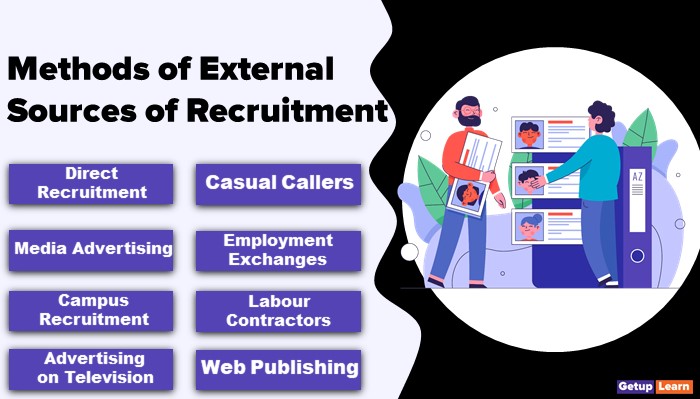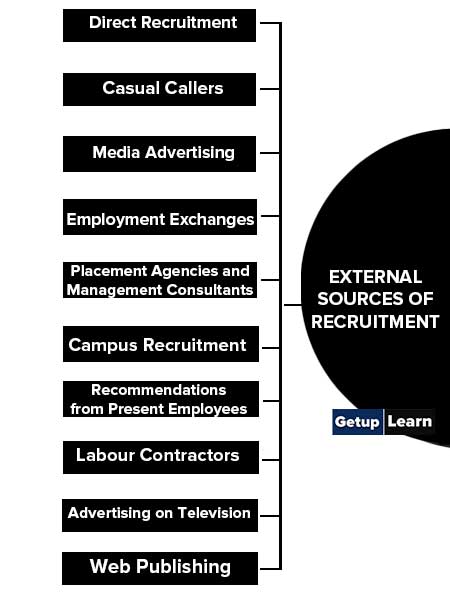
Table of Contents
Methods of External Sources of Recruitment
These are the methods of external sources of recruitment explained below:
- Direct Recruitment
- Casual Callers
- Media Advertising
- Employment Exchanges
- Placement Agencies and Management Consultants
- Campus Recruitment
- Recommendations from Present Employees
- Labour Contractors
- Advertising on Television
- Web Publishing
- Factory Gate

Direct Recruitment
Sometimes organisations paste notices at the gate of their office or factory or workshop stating the vacant job positions. The people who are interested in those jobs walk in for an interview. This method of external recruitment is most suitable for unskilled job positions, For example, sweeper, peon, etc.
Casual Callers
Generally, large organisations maintain an application file in which they keep all the pending applications that the job seekers leave with reception, sometimes the applications of suitable candidates who were not selected in the previous year’s selection process are also kept in the application file.
This application file is considered on a waiting list. Whenever there is a job vacancy suitable candidates from the waiting list are called.
Media Advertising
The most common and popular method of external recruitment is advertising about the vacant job position. The organisations select the media of advertisement keeping in mind the requirement of the job position.
For example, for the job of an accountant, the advertisement can be given in chartered accountant journals and for unskilled and lower rank job positions the advertisement can be given in local or regional newspapers.
But for high rank and skilled job positions, the advertisement is given in national-level reputed newspapers such as Times of India, Hindustan Times etc.
Employment Exchanges
Employment exchanges act as middlemen between job seekers and organisations that have vacant job positions. The job seekers leave their bio-data and details of their qualifications with the employment exchanges and when the organisations approach employment exchanges the suitable candidates are sent.
There are government as well as private employment exchanges. Government Employment Exchanges charge no fees or commissions whereas Private Employment Exchanges charge commissions or receive commissions according to the salary of the employee.
Placement Agencies and Management Consultants
Placement agencies provide nationwide service of matching demand and supply of the workforce. These agencies invite the bio-data and records from various job seekers and send them to suitable clients. These agencies charge fees for providing such a service.
Campus Recruitment
Sometimes the senior managers of the organisations visit various professional colleges, and technical institutes to get fresh graduates or people with the latest technological know-how. This type of recruitment is more common for engineers, computer programmers, MBAs, etc.
Organisations prefer fresh graduates because they can be mounded according to the requirement of the organisation.
Recommendations from Present Employees
Many firms encourage their School of Management employees to recommend the names of their relatives, friends and other known people to fill the vacant job position.
The organisations prefer recommendations by trusting the goodwill of the present employees and the organisations can catch hold of existing employees if there is any problem with the new employee recommended by him.
Labour Contractors
Jobbers and contractors are the people who keep in touch with the labour in villages and rural areas and whenever there is a vacancy or requirement for labour in a factory or in the construction site, they bring the labour from villages and supply it to businessmen.
The jobbers and contractors charge a commission for the same. This is suitable for labourers and unskilled workers. Labour contractors maintain close contact with labourers and they can provide the required number of unskilled workers at short notice.
Advertising on Television
A new trend of external recruitment is telecast on various channels regarding vacant job positions. They telecast the requirement of the job along with the qualification necessary to apply.
Web Publishing
On the internet, there are certain websites specifically designed to provide information regarding job seekers and companies which have vacant job positions. These websites can be visited by job seekers as well as companies. The common websites are Naukri.com, Monster.com, etc.
Factory Gate
Sometimes a number of job seekers enquire at the factory gate about vacant job positions in the workshop or in the factory. During the severe unemployment time, many job seekers assemble at the factory gate to offer their services to the factory. This type of external recruitment is also suitable for unskilled job positions, For example, sweeper, peon, machine operator, etc.
What are the external sources of recruitment?
The following are the external sources of recruitment:
1. Direct Recruitment
2. Casual Callers
3. Media Advertising
4. Employment Exchanges
5. Placement Agencies and Management Consultants
6. Campus Recruitment
7. Recommendations from Present Employees
8. Labour Contractors
9. Advertising on Television
10. Web Publishing
11. Factory Gate.















